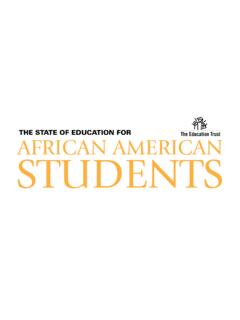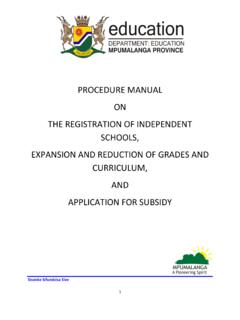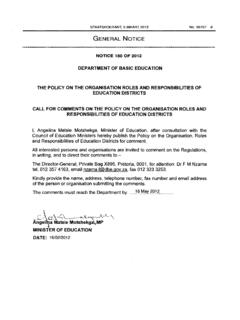Transcription of A critical analysis of legislation on the financial ...
1 162A critical analysis of legislation on the financial management of public schools: A south african perspectiveRaj MestryJnr Sec Ed Dip B Comm (Hons) B Ed M Ed D EdAssociate Professor, Department of Education Leadership and Management, University of JohannesburgOPSOMMING n Kritiese Ontleding van Wetgewing oor die Finansi le Bestuur van Openbare Skole: n Suid-Afrikaanse PerspektiefDie oogmerk van hierdie ondersoek is om die implementering vanwetgewing wat handel oor openbare skole se finansi le bestuur te verstaan,verduidelik en te kritiseer. Die artikel fokus op die weersprekings en geskillewat ontstaan het rondom die bestuur van skool-finansies sedert 1994.
2 Tweeooglopende finansi lebestuursake word ondersoek: Wie is werklikaanspreeklik vir die skool se finansies: Die beheerliggaam of die skoolhoof?Wetgewing soos die Suid-Afrikaanse Skolewet 84 van 1996 en die Indiens-nemingswet vir Opvoeders 76 van 1998 omskryf die regte enverantwoordelikhede van skoolhoofde en beheerliggame. Die tweede saakwat aangespreek word is: Spreek dit werklik sosiale regverdigheid enbillikheid aan deur die implementering van die Nasionale Norme enStandaarde vir Skool-befondsing se Beleid op Openbare Skole? Dit isnoodsaaklik dat skoolbeheerliggame wat daarna streef om skool-finansiesbehoorlik en doeltreffend te bestuur, n duidelike begrip van die wetgewingrelevant tot skool finansi le bestuur te h.
3 1 IntroductionThe government s educational reforms, since 1994, have focused onredressing historical imbalances and achieving equity in attempts torestructure south african education. The aim of this article is tounderstand, explain and critique the design and implementation ofpolicies relating to financial management in south african publicschools. Investigating and understating this central problem required theresearcher to understand its implementation from the perspectives ofthe Department of Education (DoE) officials, governing bodies,principals, parents and the communities at large. This article makes the argument that, despite substantial governmentrevisions of the education system, there is still widespreadmisconception as to who is accountable for public schools finances, andwhether social justice and equity have been adequately served by theimplementation of the National Norms and Standards for SchoolFunding (NNSSF).
4 This article is for this reason divided into two the first section, the question raised is: Who is accountable for theschools finances? To answer this question, The south african Schools legislation on the financial management of schools: A south african perspective 163 Act1 (SASA), Public Finance Management Act2 (PFMA), The Employmentof Educators Act3 (EEA) and the Education Laws Amendment Act4 will beexamined to resolve whether the principal and/or school Governing Body(SGB) is accountable for the management of school finances. In thesecond section of the paper, the implementation of the Amended NNSSF will be examined to establish whether the State has in fact addressed theissue of social justice and equity in ensuring that resources are equitablydistributed to all public schools and learners in the provision of The Accountability of school FinancesSASA was the first attempt to involve communities in governance, and toset guidelines for self-managing and governing schools.
5 Self-managingschools, a process that is also referred to as decentralisation, means thatthe State delegates authority to schools with a shared decision-makingmodel engaging various SASA gives unprecedentedresponsibilities to SGBs of public schools, placing them in a position oftrust towards schools, and making them primarily responsible for theeducation of learners through democratically elected An SGBis a statutory body of parents, principals, teachers, non-teaching staff andlearners of secondary schools One of the primary functions of theSGB is to determine school policies, which must be implemented byprincipals and decentralisation allows stakeholders to participate at a levelin which they can have direct impact on matters that concern them, itallows different capacities and inequalities of power and influence, atgovernance level, to be expressed more The role of principalsand SGBs in managing a school s finances is complex: the functions ofprincipals and SGBs appear to overlap, and this usually gives rise toconflicts among them.
6 In order to lessen, or eliminate conflicts amongvarious stakeholders of schools, provincial departments of educationregularly send out circulars, or memoranda, to them explaining orclarifying the interpretation and implementation of It is,therefore, imperative if SGBs are to be effective that they have knowledgeof rights and responsibilities of SGBs are clearly defined inlegislation. The Bill of Rights as enshrined in the Constitution protects the1 Act 84 of 1 of 76 of 31 of General Notice 29179; Notice & Bisschoff & Bisschoff 16(1) , Motala & Vally 2003 Gauteng Department of Education Circular 13 of 2000; Circular 9 of 2013 De Jureprincipal and other school governors as persons having human rights,such as their right to freedom of speech, their right to privacy and humandignity, and their right to just administrative SASA and the EEAdefine the rights and responsibilities of principals in their official capacityas employees of the provincial departments of education.
7 SASA underpins school governance, while the EEA emphasises the professionalduties of the principal in management. Although the PFMA has no directbearing on schools per se, the Department of Education applies certainsections of the PFMA to prescribe how schools should manage theallocated funds from the National Treasury. This implies that principalsare accountable to their respective Heads of Departments (HoDs) forsubsidies received from the State. The PFMA will be examined to determine how this Act applies toschool 1 Public Finance Management ActAs mentioned in the previous section, the PFMA has no direct bearing onschools per se. However, the HoDs, as accounting officers for theprovincial departments of education, usually prescribe through circularsto principals and SGBs how the State s resource allocation for schoolsshould be spent.
8 The schools are obligated to spend State funds forresources, services and repairs and maintenance of schools. Thespending of these funds is ring-fenced. For example, 50% of the budgetshould be allocated to learning and teaching support materials, and 50%for services rendered, repairs and maintenance of schools. Principals areadvised not to deviate from this notice. Based on section 16A of SASA,the principal is placed in an enviable position to adhere to theDepartment s directives. In actual fact, the Department has no right toprescribe how State funding in respect of resource allocation should beexpended. Once the Department determines the budget for schools, andaccordingly releases the funds to these schools, the SGBs should takeresponsibility for the said funds.
9 In the case of schools granted section 21functions in terms of SASA, the funds will be deposited directly into theschools banking accounts. Where schools have not applied for theseadditional functions, the Department will spend the money on behalf ofthese schools. It should be emphasised that in this instance the schoolsreceive a paper budget from the provincial department of education andthe funds essentially belong to the schools. The Department is merely thecustodian of the funds but has no claim whatsoever over these 2 The south african Schools Act and Employment of Educators ActSASA states that the governance of the school vests in the SGB of theschool and the professional management of a school must be undertaken11 General Notice 17678.
10 legislation on the financial management of schools: A south african perspective 165by the The Act provides that the Department s managementfunction is limited to the professional management of the school throughthe principal, as the employee of the Department. financial management, a crucial function of school governance, canbe defined as the performance of financial management actions ofschools with the main aim of achieving effective education. Thepreamble to SASA emphasises a partnership between the parents and thegovernment, and aims ultimately to devolve maximum decision-makingand power from education departments to SGBs. SASA gives meaningfulfunctions to SGBs, and also underpins the management of public schools In the discussion that follows, the roles and responsibilities ofSGBs and principals in school financial management are gives the responsibility of financial management to SGBs andnot solely to principals.
















